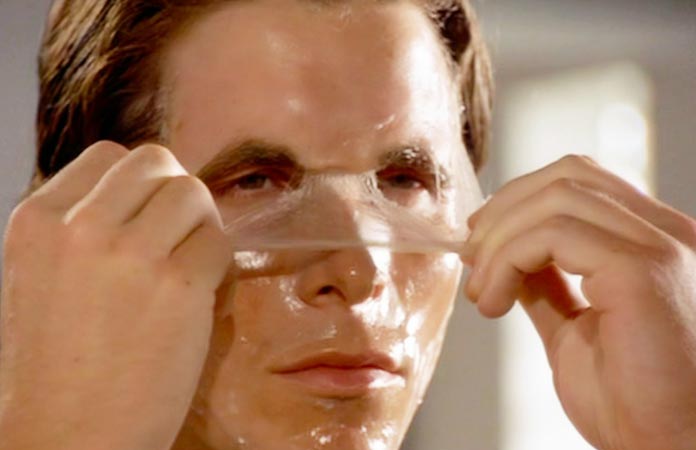Retro Review: American Psycho
Published on February 16th, 2016 in: Feminism, Horror, Movie Reviews, Movies, Retrovirus, Reviews |Toronto residents! If you haven’t seen American Psycho in a while or if you’ve never seen it on the big screen, you’ll get your chance February 17 at the Carlton, where The MUFF Society is putting on a screening of the film at 9:00 p.m.
The quirky genius of Mary Harron and Guinevere Turner’s film adaptation of Bret Easton Ellis’ controversial novel, American Psycho, lies in the generic nature of its characters and its excoriation of the wretched Yuppie movement of the 1980s. The movie is infused with comedy as dark as motor oil, and social commentary so sharp that watching the movie could cut your retinas. For a certain level of society, this is the definitive Eighties flick, even more cynical and astute than Oliver Stone’s Wall Street.
There is also an extended scene with a chainsaw, so that’s an automatic win.
Christian Bale plays Patrick Bateman, a man who might be real, who works for the financial firm of Pierce & Pierce. He is gorgeous, wealthy, and psychotic. His life consists of a strict beauty and fitness regimen, attempting to secure reservations at the hottest restaurants in town, and bouts of freaky sex that end up with somebody bleeding.
Those restaurants become characters themselves, unreachable icons of a self-imposed caste system. It’s a boast that a person can get a table at Dorsia. It’s a symbol of power, and it’s presented as ludicrous. There is also a great bit about who has the best business cards. Bateman almost flies into a homicidal rage when someone presents a better business card than his own. The man with the most well-designed card ends up being the first target of Bateman’s rage.
Bateman kills the dude, wraps his head in plastic, and keeps it in the refrigerator. Then he takes over the man’s identity and his apartment. It’s a bold move, both terrifying and hilarious, and ultimately pointless.
None of these schmucks can tell each other apart. These yuppies can’t remember each others’ names or where they work. They don’t know anything about each other, even they seem to be together all the time. Everyone mistakes Bateman for someone else. He’s Halberstram. He’s Paul Allen. He seems to be everyone but who he thinks he is.
The mystery of the movie isn’t why is Bateman killing people. It’s, “What is Patrick Bateman?”
Towards the end, we’re not even sure if his violence against women and his enemies is real. The script seems to indicate that it isn’t, but does nothing to fill the human shell that is Bateman. Maybe he is nothing but an archetype, the perfect blueprint for the shallow, vacuous, money-loving bastards we thought died at the beginning of the 1990s. But they didn’t die. They went underground.
Now we have human waste glands like Martin Shkreli, the smarmy big pharma dudebro, charging $750 for one dose of AIDS medication; and Donald Trump, who has built a political career out of role-playing Martin Sheen’s character from David Cronenberg’s The Dead Zone. These people seem like they are one foul breeze away from killing a hooker with a chainsaw, and yet they’ll never get caught because they are rich. They’re like cicadas.
There’s a scene at the beginning of American Psycho in which Bateman removes the pore-cleansing mask from his face. The mask is clear. It’s like Bateman peels off his own face, and beneath that, is the same face. Layers and layers of the same thing, a never-ending onion, the epitome of self-absorption. Bateman even says that he is empty inside, devoid of emotion.
We all go a little crazy from time to time. That’s just part of the human condition. We don’t all try to feed a stray cat to an automatic teller machine, like Bateman does, but we all go over the edge once in a while. We need those moments to clear the slate, go full tabula rasa.
The problem with Bateman is that he is all trappings and no center. He’s the centerpiece for a meal that never comes, yet he still appears to be a fully functioning human being. The glory of American Psycho is how well it captures that sociopathic undercurrent in our society.
That glory is the same reason American Psycho is a cautionary tale, and one that is, to our shame, timeless.
>

Time limit is exhausted. Please reload the CAPTCHA.